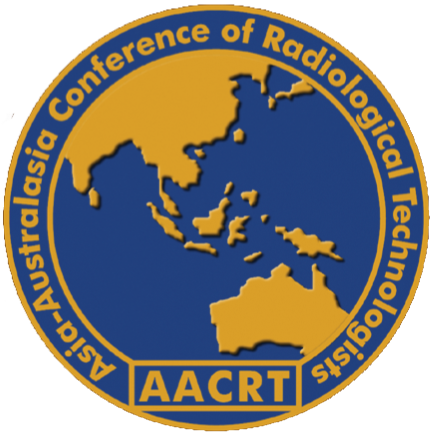Education Lecture
Artificial Intelligence (AI) in Medical Image and Radiological Technology
Hiroyuki Sugimori
Symposium1:
Artificial Intelligence (AI) in Radiation therapy
1. Contribution of artificial intelligence in radiation therapy
Iori Sumida
2. Artificial Intelligence (AI) in Radiation therapy ~RapidPlan~
Kazuki Kubo
3. Current status and future perspectives of accelerator-based boron neutron capture therapy
Takahiro Kato
4. Artificial Intelligence in Radiation Therapy
Wataru Maehana
5. Artificial Intelligent in Precision RadioTherapy
Jeong Hee Cho
6. Stereotactic Radiosurgery (SRS) for brain metastases: Dosimetric comparison between multi-isocenter DCAT and mono-isocenter VMAT
Phyllis Ching Laam
7. Radiation Therapy in Singapore
Tan Chek Wee
Symposium2:
Current situation of various countries in emergency medicine and the role of radiological technologists in hospitals
1. The Usefulness of CT Scans in Emergency Medicine and the Role of Radiological Technologists
Hiroyuki Yamamoto
2. Current situation of various countries in emergency medicineand the role of radiological technologists in hospitals
Yi-Chi Hung
3. What are our Roles as Radiographers in Emergency Medicine?
Choi Nga Yee Melinda
4. Key points from the work of Radiological Technologists in Macao Hospital in the Covid-19 pandemic
Cora NG
Symposium3:
Role of radiological technologists in the management of medical radiation exposure
1. The role of radiological technologists in radiation dose management in Japan
Masaaki Fukunaga
2. Role of radiological technologists in the management of medical radiation dose
Kuei-Yuan Hou
3. Radiation Dose Optimization in DSA - A radiographer leading CQI project
Edward Chan
4. Role of Radiological Technologists in the Management of Medical radiation Exposure
Kitiwat Khamwan
Symposium4:
Role of radiological technologists for Covid-19 and efforts in the hospital
1. Mobile workflow for CT examination in the COVID-19 pandemic
Yusuke Morimitsu
2. Radiological Technologists in Pandemic Our role in COVID-19
Yeonjun Park
3. Role of radiological technologists for Covid-19 and efforts in the hospital
Cheng-Hui Lee
4. Role of Radiological Technologists for Covid-19 and Efforts in the Hong Kong Hospitals
Millie Ng SR
5. Role of Radiological Technologists for Covid-19 and the efforts in the hospital: Thailand experience
Napapong Pongnapang
Corporate session
1. A deep dive into the future of intelligent Cancer Care
Takahiro Hara
2. AI Segmentation in adaptive workflow
Tomasz Morgans
Oral Presentation
A-01. The Consideration of Radiological Technologist’s Perception regarding Artificial Intelligence Radiology Imaging
SANGJIN KIM
A-02. Reducing the psychological burden on radiographers during mammography examinations of patients showing symptoms of an infectious disease amid the COVID-19 pandemic
Tokiko Nakamura
A-03. Estimation of mean glandular dose (MGD) and image quality in low energy contrast enhanced dual energy mammography (LE-CEDM) with single layer filter and double layer filter
Sachi la Niroshani
A-04. Development and Accuracy Evaluation of Augmented Reality Based Patient Positioning System in Radiotherapy: A Phantom Study
KAZUO TARUTANI
A-05. The Efficiency of Medical Imaging AI in Clinical Setting
Edward Chan
A-06. Dosimetric commissioning of range shifter bed for superficial region treatment in spot scanning proton therapy
Seiichi Ota
A-07. Decreases in Scattered Radiation Dose with a Novel Radiation Protection Shield in Pediatric CT Examination
Kengo Nakato
A-08. Development of a radiation measurement system using the Internet of Things and semiconductor detectors
Michiru Nikaido
A-09. Image quality and exposure dose in ultra-high-resolution CT imaging with new deep learning-based reconstruction parameter: A phantom study
Yuta Miyamae
A-11. Dosimetric comparison between coplanar and non-coplanar volumetric modulated arc therapy in primary brain tumours on sparing hypothalamic-pituitary axis
Cheung Yi Wah Eva
A-13. Correlation between Hounsfield Unit derived from Computed Tomography of a Head, Thorax, Abdomen, Spine and Pelvis and T-scores from Dual Energy X-Ray Absorptiometry
MOHAMAD AMIN MOHAMAD FARHAN
A-14. Development of high-precision semiconductor dosimeter for dental intra-oral X-ray equipment
Toru Negishi
A-15. Elucidation of brain function in the relaxation effect of ASMR
Noriko Sakurai
A-16. Analysis of information pandemic about radiotherapy
Hiroki Ohtani
A-17. Automated Classification of Fragile Plaques and Fibrous Plaques on Coronary Computed Tomography Angiography using Deep Learning
Akira Hasegawa
A-18. Brain metabolic alterations in anxiety disorder: 1H MRS study
Ken Ohno
A-20. Training effectiveness of Virtual Reality Coaching System for Radiological Technologist
Kengo Kato
A-21. Comparison of the brain quantitative values of phantom data using a reconstruction method
Toshiaki Sasaki
A-22. About validity of the Japan DRLs 2020 of the Upper GI medical examination
Kazuyuki Sumi
A-23. A study of human body expression of the angle and length in X-ray photography
Yukari Yamashita
A-24. The role of radiographers in interventional radiology Indonesian Radiographers Perspective
Susanta I Putu Adi
E-01. Evaluation the clinical data and SYNTAX score of patients with coronary heart diseases to predict coronary artery stenosis using inverse problem algorithm
Chao-Yu Chiang
E-02. Effect of Arterial Input Function on DCE-MRI Parameters of Lumbar Spine in Osteoporosis
Yang Hou-Ting
E-03. Prenatal diagnosis of anal atresia by 2D and 3D ultrasound
CHEN LIHSUN


